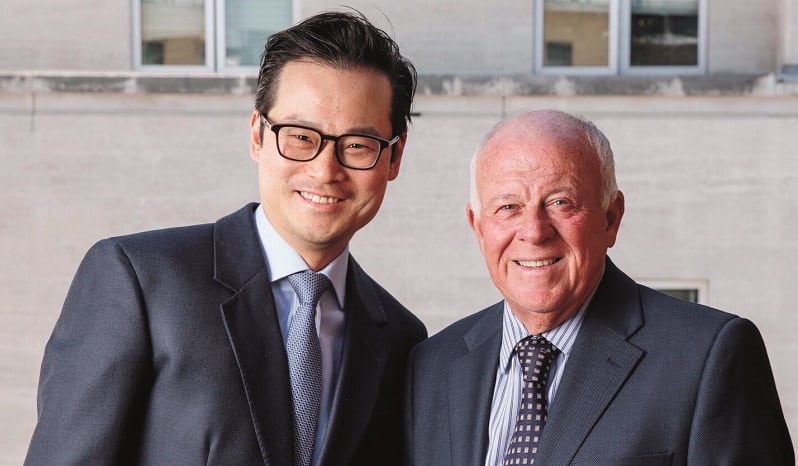Peter Hargreaves has cited Blue Whale’s “young” team as one of its strongest selling points against more established global fund managers like Fundsmith and Lindsell Train.
Blue Whale Growth recently celebrated a milestone as its assets under management hit the £1bn mark. Manager Stephen Yiu (pictured left) launched the fund four years ago this month with £25m of seed capital from Hargreaves (pictured right).
During a virtual Q&A on Tuesday, Hargreaves was asked why people should invest in the fund over more established names like Lindsell Train and Fundsmith.
Responding, the soon to be 75-year-old Hargreaves Lansdown co-founder said the six-strong investment team has youth on its side. The average age on the team is 35 and Yiu, who is the oldest, will be turning 43 this year.
“One thing that people should be very, very aware of is the age of the investment team,” he said. “A lot of established funds in the marketplace, the fund managers are close to retirement. And so, who are you going to get next? Remember the furore when Anthony Bolton retired from Fidelity?”
‘We want to do a bit better’ than global fund giants
Speaking on Fundsmith and Lindsell Train, Yiu said: “I have enormous respect for the other two competitors, and I think there’s a lot of good things that they have done over the last 10 years.”
But he added: “We are very competitive, we want to do a bit better.”
Since launching in September 2017, Blue Whale Growth has returned 113.1%, outpacing Terry Smith’s Fundsmith Equity (84.7%), Lindsell Train Global Equity (59%) and the IA Global sector average (57.2%).
However, over the course of their lives Fundsmith Equity and Lindsell Train Global Equity have generated enormous gains of 541.3% and 377.2% respectively.
Blue Whale Growth not looking to invest in China anytime soon
Yiu’s fund has garnered attention for its punchy exposure to US stocks, which make up 71.3% of the portfolio, and tech names, which account for 54% of holdings.
With such a high concentration of US companies, the pair were asked whether they might consider investing in cheaper markets, specifically China.
Blue Whale Growth does not invest directly in China, and Yiu has no plans to do so. He said uncertainty over the country’s domestic policy and questions over the level of transparency and corporate governance have given him pause.
“I think the worry about China is getting the information,” Hargreaves agreed. “You’ve got to remember it is not a democracy. The government can interfere in a major way with what could happen there, and I think you have enough worries in investment without worrying about political interference with companies.”
Another “big worry” is the property market, Hargreaves added, which is “huge and heavily mortgaged”. The debt crisis at Chinese real estate developer Evergrande has been thrust into the spotlight in recent weeks, with fears it could lead to a contagion effect.
Inflation
Yiu said he is not worried about the impacts of higher inflation on his portfolio.
Microsoft, one of the fund’s top 10 holdings, recently announced it would raise subscription prices for its Office 365 software by 15-20%, a move he said, “has nothing to do with inflation”.
The $2trn company has been growing its top line by over 10% year-on-year, Yiu notes, so doesn’t face the same input pricing pressure as other businesses. “Their gross margin would be close to 90%. And so, inflation is not going to affect them.”
This is a different kettle of fish to a “traditionally good business” such as Unilever, which is seeing margin pressure due to rising oil prices and could lose customers to competitors like Procter & Gamble and Nestle if it hikes prices.
New holding Nvidia is another example of an inflation proof business in the portfolio, he said.
Already in the top 10 holdings after being added to the portfolio in August, Yiu said Nvidia’s graphics chips, which are used in gaming and crypto mining, will see huge demand thanks to the “data explosion” from personalised cloud services, like Google Home and Amazon’s Alexa, and the rollout of 5G.
“We don’t need to worry about anything in terms of macro uncertainty. Even if we talk about inflation and rising interest rates, they are going to win a much bigger share in the next five years.”
Yiu talks Salesforce exit and trimming Adobe
Yiu told the virtual audience he has been raising cash in the fund “just to be opportunistic”.
In August he made several changes to the portfolio, including winding down his position in Salesforce.
Though the cloud computing giant was in his top 10 holdings, Yiu sold out on valuations grounds and concerns it would keep making large acquisitions. Last December the San Francisco-based company purchased Slack for $28bn and Yiu worried it would continue down an acquisitive path in order to compete with Microsoft.
“A lot of acquisitions are not profitable to start with, or not highly profitable. So, I think in terms of how we define high quality businesses, the return on investor capital profile for Salesforce is going to deteriorate,” he said.
He has also been paring back his holding in Adobe, another top 10 holding, to redeploy capital into other attractive names in the portfolio.
While Yiu said Adobe may look expensive in the short-term on certain metrics, in the medium-term it is “still a fairly high-quality business, growing sensibly”.
“The margin is very high, it’s net cash, and there’s no competitor in that space.”










